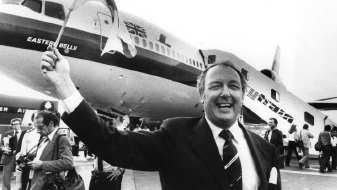Freddie Laker
Sir Freddie Laker, airline pioneer, died on February 9th 2006, aged 83
IN A lifetime dedicated to piloting and managing aircraft of all sorts, Freddie Laker rarely felt scared. But there were exceptions. In the winter of 1948–49 he found himself flying old Halifax bombers over Germany, going to the relief of Berlin after it had been blockaded by the Russians. Ice coated his windscreen. More ice would have clogged his wings, had he not smeared thick grease over them. Russian planes buzzed him and, unable to get much height, he could watch Russian guns firing at him from the ground.
In these planes – “deathtraps” and “junk” as he thought of them – he and his team flew 4,700 sorties in 54 weeks. Under each plane, roughly in place of the bomb chamber, hung a pannier containing oil, coal and potatoes. Though the oil added to the hazard, the coal was worse, covering him with black dust as though he had been down a mine. But Mr Laker could not have cared less. “It was all about freedom,” he said later.
Flying and freedom were inseparable in his mind. They had been so ever since, as a yobbish teenager eating fish and chips in the street with his mates, he had looked up to see the German airship Hindenburg and a Handley Page biplane flying at the same moment over Canterbury Cathedral. Home life was a struggle in a cold-water flat, school a dead end, but up there was limitless. For the rest of his life, whenever high spirits seized him, the big, ebullient, grinning Mr Laker would spread out his arms and mimic a plane.
Yet the sky, he was soon to find, was not as open as all that. Commercial air routes had been neatly divided up between big carriers and, after the war, the Labour government nationalised the industry. On both sides of the Atlantic, politicians and national airlines colluded with each other to keep ticket prices high. The ordinary man could only dream of flying. The wide blue yonder was out of his reach.
That it is not so these days is largely due to Mr Laker. Any passenger who now jets to Italy or Greece for the price of a train fare to the suburbs is following the trail he blazed. Mr Laker in 1977 introduced the first outrageous discounts, £118 ($206) to fly the Laker Skytrain from London to New York, and the first taste of no frills: if staff were scarce, he sometimes loaded bags himself. And he offered these benefits on long-haul flights, something his brash young acolytes – from Southwest Airlines to Ryanair to easyJet – have yet to attempt.
The public loved it. By the end of its first year, Skytrain had made profits of £3m and the number of passengers from Britain to America had shot up by 30%. Within five years, it had 20 aircraft. Then, inexorably, the big carriers closed in. Since restrictive trade agreements, underpinned by legislation, could not keep Mr Laker out, they slashed their own prices to undercut him. This, and the world recession of 1980–81, drove Laker Airways into bankruptcy. Only when the creditors sued did the airlines plead guilty to predatory pricing. Mr Laker’s best advice to his disciple and friend Richard Branson, when Mr Branson was setting up cut-price Virgin Atlantic, was to sue the bastards before, not after, going belly-up.
Up until 1982, Mr Laker had thrived on luck

and opportunism. By meeting a useful man in 1941, he learned from scratch to fly four-engine aircraft. His first enterprise was to sell aeronautical spare parts out of the boot of a car, his second to strip the platinum points off the spark-plugs of Bristol Hercules engines. The Berlin airlift (“the best piece of luck I ever had”, since he just happened to have bought 12 of those second-hand bombers) got him easily and profitably into the cargo-delivery business. This led him to think of ways to wriggle into the commercial passenger trade.
He made his play deviously and slowly. In the 1950s he converted a fleet of DC4s to take passengers and cars from Southend, which the big carriers did not use, to Calais. Then in 1966 he observed that a loophole in the law allowed independents to take “affinity groups”, such as clubs, abroad. Immediately, his passengers were made members of the Right Wheel Group or the Left Wing Club, and Mr Laker would appear at Gatwick with a Bible on which they would swear club allegiance if the airline snoops were watching. Once the Department of Trade had rumbled him, in 1971, he began to think of a different ruse to break the cartel: running an air operation that passengers would treat likea train. The rest was history.
His adventure with Laker Airways earned him a knighthood from a red-faced Labour government and the devotion of Margaret Thatcher. He bought boats, Rolls Royces and race horses, and regularly changed wives. After the crash he left England, feeling unappreciated, to toy with low-cost airlines in Florida.
His last venture, in 1996, flew out of the Bahamas. This one was rather different to the others he had managed. There were leather seats and gilt-edged dinner plates; wines were served in crystal glasses. Mr Laker had made flying, once again, an occupation for the elite. Nonetheless, the man on the 9.30 from Stansted to Palma, crushed in a middle seat between crying children and with a home-made sandwich as his sustenance, should raise a plastic cup to freedom and to Freddie.